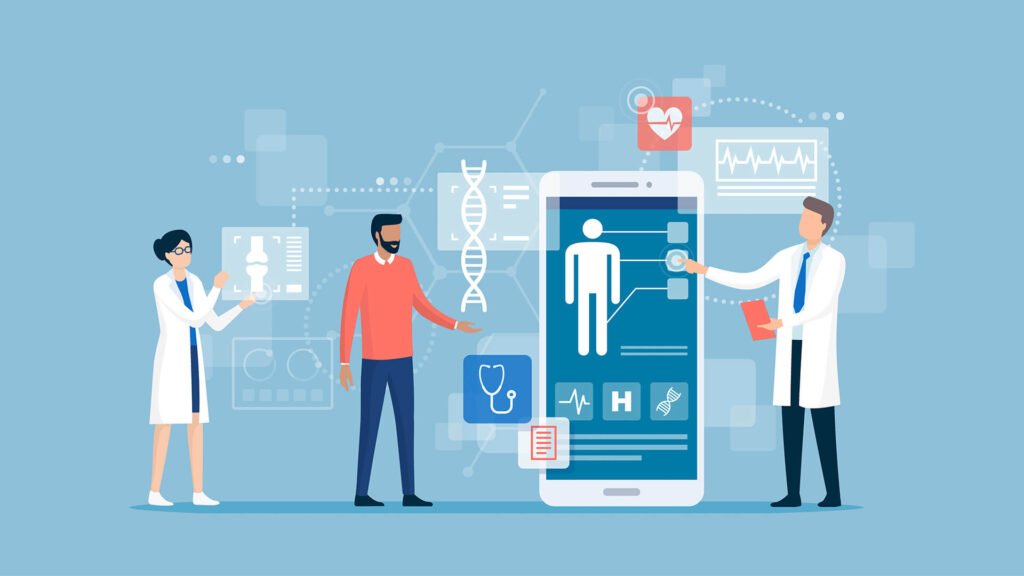The healthcare sector is undergoing a profound evolution, driven by rapid technological advancements and the need for more efficient, patient-centric care models. As healthcare providers strive to meet rising patient expectations, control costs, and improve outcomes, Healthcare IT Solutions and Healthcare Digital Transformation are emerging as essential catalysts of change.
This article explores how digital transformation is reshaping healthcare operations, the technologies enabling this shift, and the strategic advantages it offers to forward-thinking healthcare organizations.
The Imperative for Digital Transformation in Healthcare
Healthcare systems around the world are facing unprecedented challenges:
- Rising costs of care delivery
- Increasingly complex patient needs
- A global shortage of healthcare professionals
- Growing regulatory and compliance requirements
Traditional models of healthcare management, heavily reliant on manual processes and fragmented data, are no longer sustainable. Healthcare Digital Transformation is not a luxury—it is an operational necessity. The adoption of advanced Healthcare IT Solutions allows providers to streamline workflows, improve decision-making, and deliver higher-value care.
Key Technologies Driving Healthcare Digital Transformation
The foundation of digital transformation in healthcare lies in harnessing cutting-edge technologies that optimize clinical, operational, and administrative processes.
1. Electronic Health Records (EHRs)
EHRs have revolutionized data management by creating centralized, digitized patient records accessible across care settings. EHR integration enhances care coordination, reduces duplication of services, and ensures that critical information is always available at the point of care.
2. Artificial Intelligence and Machine Learning
AI and ML are enabling predictive analytics, clinical decision support, and early disease detection. From automating diagnostic imaging analysis to streamlining administrative tasks, AI-driven Healthcare IT Solutions are enhancing both efficiency and patient outcomes.
3. Telemedicine and Remote Monitoring
The COVID-19 pandemic accelerated the adoption of telehealth services. Today, virtual care, remote patient monitoring, and wearable technologies are integral to the Healthcare Digital Transformation journey, ensuring access to care anytime, anywhere.
4. Robotic Process Automation (RPA)
RPA tools automate repetitive administrative functions such as patient registration, billing, and claims processing, significantly reducing manual errors and freeing up staff for higher-value tasks.
5. Cloud Computing and Interoperability
Cloud-based solutions and interoperability standards are breaking down data silos, enabling seamless information exchange across departments, providers, and even borders.
How Healthcare IT Solutions Improve Operational Efficiency
Healthcare organizations are embracing digital transformation to drive measurable improvements in efficiency, quality, and patient satisfaction.
Streamlining Clinical Workflows with Healthcare IT Solutions
- Automated scheduling and resource allocation
- Integrated care coordination platforms
- AI-powered diagnostic tools that reduce decision-making time
By digitizing workflows, healthcare providers reduce bottlenecks, minimize delays, and improve the timeliness of care.
Enhancing Patient Engagement through Digital Transformation
- Patient portals for appointment booking, medical records access, and communication
- Virtual consultations and follow-ups
- Personalized health tracking via mobile apps
Empowering patients with digital tools fosters engagement, compliance, and ultimately better health outcomes.
Optimizing Revenue Cycle Management (RCM)
- Automated claims processing and denials management
- Real-time billing and coding assistance
- Predictive analytics for financial forecasting
Healthcare IT Solutions in RCM help organizations maximize revenue collection, reduce claim denials, and improve financial sustainability.
Overcoming Challenges in Healthcare Digital Transformation
While the benefits are clear, the path to Healthcare Digital Transformation is not without hurdles:
Data Security and Compliance
Protecting sensitive patient information is paramount. Adhering to standards such as HIPAA and GDPR requires robust cybersecurity measures, encryption, and data governance policies.
Resistance to Change
Healthcare is inherently risk-averse. Successful digital transformation requires strong leadership, comprehensive change management, and staff training to overcome cultural resistance.
Integration Complexities
Many healthcare providers operate legacy systems that can be difficult to integrate with modern platforms. Choosing interoperable, scalable Healthcare IT Solutions is essential for long-term success.

The Strategic Value of Healthcare Digital Transformation
Digital transformation is not merely about adopting technology—it’s about reimagining the delivery of healthcare itself. The strategic value lies in:
- Improved Quality of Care: Data-driven decision-making leads to earlier interventions and more accurate diagnoses.
- Cost Reduction: Automation and efficiency minimize waste and administrative overhead.
- Increased Access: Virtual care models break down geographic and financial barriers to care.
- Enhanced Workforce Productivity: Technology empowers clinicians to focus on patient care, not paperwork.
Healthcare organizations that proactively invest in Healthcare Digital Transformation position themselves as leaders in an increasingly competitive and value-driven market.
Real-World Impact: Case Study Example
Consider the example of a mid-sized hospital network that implemented AI-driven diagnostics, EHR integration, and robotic process automation in their billing department. Within 12 months, the hospital achieved:
- A 20% reduction in patient wait times
- A 30% improvement in billing accuracy
- A significant rise in patient satisfaction scores
This transformation not only boosted operational efficiency but also enhanced the hospital’s financial resilience—showcasing the tangible ROI of Healthcare IT Solutions.
Preparing for the Next Frontier in Healthcare IT
The future of Healthcare Digital Transformation promises even greater innovation:
- Precision Medicine: Using genomic data to tailor treatments
- Blockchain in Healthcare: Securing medical records and ensuring data integrity
- Virtual Reality (VR) and Augmented Reality (AR): Revolutionizing medical training and patient care
Healthcare providers must remain agile, continuously investing in new technologies while maintaining a patient-first approach.
Conclusion: Embrace the Future of Healthcare Operations
As global healthcare systems face mounting pressure to deliver higher-quality care at lower costs, Healthcare Digital Transformation is no longer optional—it is essential.
By adopting advanced Healthcare IT Solutions, organizations can:
- Enhance operational efficiency
- Improve patient outcomes
- Drive financial performance
The digital healthcare revolution is here. Those who lead the charge will not only survive the shifting landscape—they will define the future of care delivery.